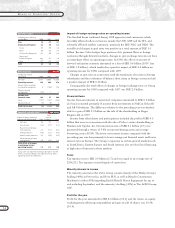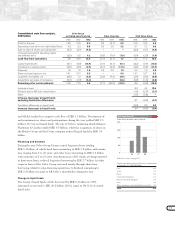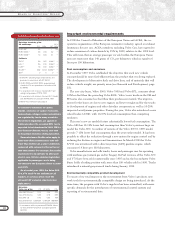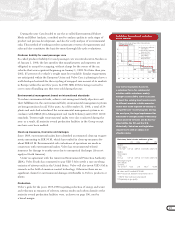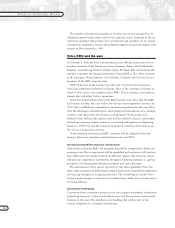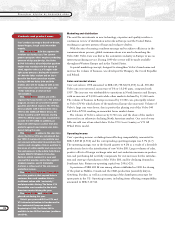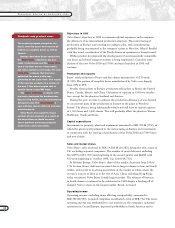Volvo 1998 Annual Report Download - page 25
Download and view the complete annual report
Please find page 25 of the 1998 Volvo annual report below. You can navigate through the pages in the report by either clicking on the pages listed below, or by using the keyword search tool below to find specific information within the annual report.
23
Foreign exchange risks
For Volvo, activation of the EMU will result in lower costs in connection with
hedging of foreign exchange rates in transactions. The positive effects arise as
a result of lower interest-rate differentials and greater currency stability in the
EMU, fewer currencies to be hedged, and through the disappearance of differential
buy and sell exchange rates. During the convergence process in recent years Volvo
experienced a substantial reduction in foreign-exchange hedging costs, due to
narrower interest-rate differences and greater stability in EMU currencies.
Volvo has analyzed its outstanding financial contracts and has preliminary
established that it will not be necessary to renegotiate any existing contracts
during the transition period. Most of the contracts that hedge commercial flows
fall due between 1999 and 2002. Hedging of shareholders’ equity denominated
in an EMU currency will not be translated until the company in question
changes over to the euro.
Volvo’s policy governing hedging will be reviewed as part of the preparations
for the changeover to the euro.
Accounting
Volvo is engaged in preparations to ensure its ability to change over from Swedish
kronor to the euro as a Group currency. Volvo has not made any decision to change
over to use of the euro as a currency for accounting and reporting. The date of the
changeover will depend on Swedish legislation and current business conditions.
A Stockholm Stock Exchange listing of Volvo shares in euros will be considered
as soon as demand arise.
Volvo and the Millennium
The changeover to the year 2000 for computers, microprocessors and the software
used in such equipment constitutes a global problem of major importance. As a
result of the very widespread use of information technology, the changeover will
affect most companies, including Volvo.
The work conducted within Volvo to identify and solve problems that may arise
has a high priority. Responsibility for this process has been decentralized and rests
with each business area manager. Support, reporting and follow-up activities are
handled at the Group level. Volvo’s objective is to enter the new century without
any serious interruption of operations.
Volvo is using a four-step quality-assurance method that is designed to
eliminate problems in the areas of computer environments, applications and
embedded systems. The four steps are: inventorying, analyzing/setting priorities,
corrective actions, and verification. It is expected that the greater part of the
computer environments and applications will have been modified and tested
during second quarter of 1999. Most of the embedded systems are expected to
be modified by the end of June 1999 in order to be able to test-run them during
the vacation period.
Volvo is participating in the American automotive industry’s program to ensure
that the supply chain is well prepared for the changeover to the new millennium.
This program, which is being managed by the Automotive Industry Action Group
(AIAG) is based on the premise that players in the industry share a common



